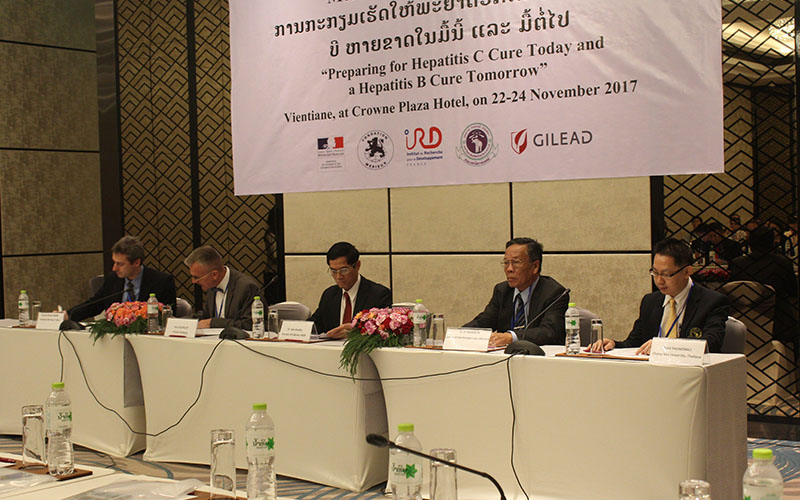
The Mérieux Foundation organized the workshop “Preparing for Hepatitis C Cure Today and a Hepatitis B Cure Tomorrow” with the aim of:
- Creating a network of healthcare professionals in charge of the medical follow up of patients suffering from chronic hepatitis in the region, especially to share best practices, research results and experience in patient monitoring and care within neighboring ASEAN countries;
- Promoting regional research on chronic hepatitis, initiating multi-site research projects;
- Identifying the conditions for a wider, immediate access to HCV treatment and facilitating HBV therapy as well.
The Mérieux Foundation has been organizing annual workshops in Laos since 2012 to improve the management and treatment of patients affected by viral hepatitis. In 2016, the symposium took on a regional dimension to provide a platform for brainstorming and exchange of ideas on actions to improve the management of viral hepatitis in the whole Mekong region.
For this 6th national and 3rd regional workshop, the 100 participants came from Cambodia, France, Laos, Myanmar, Nepal, Thailand and Vietnam. The workshop was organized jointly with the Center of Infectiology Lao Christophe Mérieux, the Ministry of Health of Laos, IRD UMI 174-PHPT: Institut de recherche pour le développement and Chiang Mai University Research Collaboration in Thailand. It received support from the Chiang Mai University, the Ministry of Europe and Foreign Affairs, the Mérieux Foundation, and Gilead.
“Update HIV treatment and care”
The workshop “Update HIV treatment and Care” is the 10th national seminar on HIV/AIDS. With 50 participants from all antiretroviral treatment centers in Laos, it was an opportunity to present the experiences of users of “open” and “closed” platforms for HIV viral load measurement in different countries, including neighboring Myanmar.
Resistance to antiretroviral treatment in Laos was also presented, as well as co-infections with HBV and HCV viruses in Laos.
The workshop on HIV was organized jointly with the Center of Infectiology Lao Christophe Mérieux and the Center for HIV/AIDS and Sexually Transmitted Infections (CHAS).
Hepatitis and HIV viral load measurement at the Center of Infectiology Lao Christophe Mérieux
Viral hepatitis kills one million people every year worldwide, and Southeast Asia is disproportionately affected by these infections. In particular, Laos is facing one of the highest incidences of hepatitis-related liver cancer incidence in the world, after Mongolia. The prevalence of HBV in Laos is an estimated 8 to 10%, or roughly 530,000 to 670,000 infected individuals. National health workers and politicians have to be sensitized on the hepatitis issues. The Rodolphe Mérieux Laboratory in Vientiane, built by the Mérieux Foundation, provides HBV and HCV viral load measurement, a type of testing that is not currently available in Laos.
As for HIV, it is estimated that about 12,000 people are living with HIV in Laos, representing a prevalence rate of 0.2%. Before the establishment of the Center of Infectiology Lao Christophe Mérieux, patients and clinicians did not have access to viral load measurement in Laos. With the network of eight treatment centers in the country, the Mérieux Foundation provides people on antiretroviral (ARV) treatment with viral load measurement. From 2009 to 2016, an average of 3.75 viral load measurements were carried out per patient; thanks to this, the Mérieux Foundation was able to establish that 89.1% of people on ARV have an undetectable viral load, very close to the 90% target set by UNAIDS.
